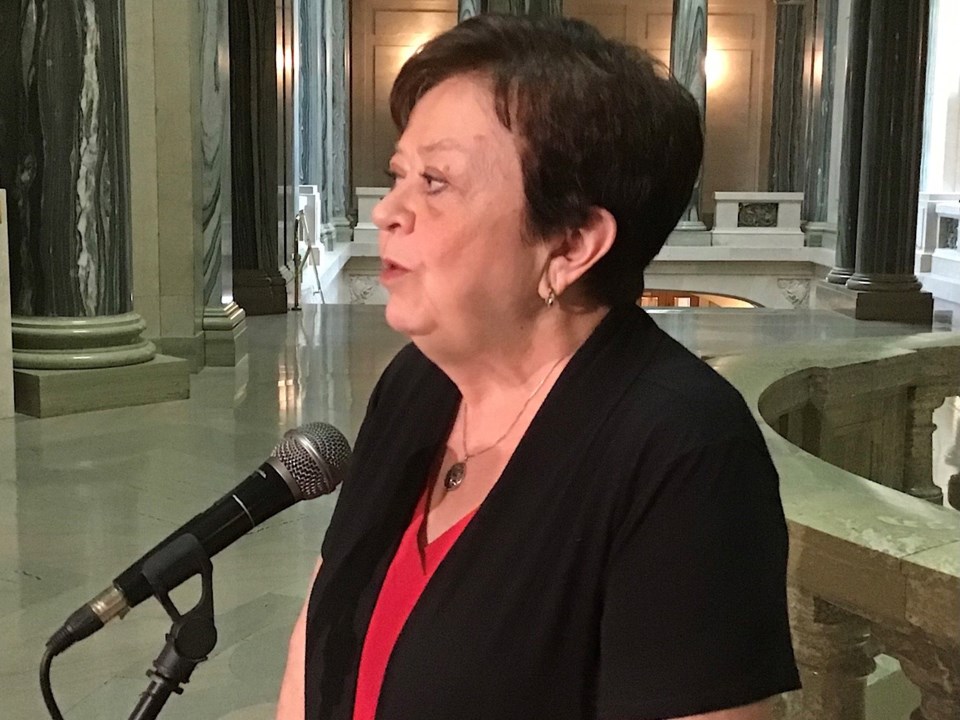REGINA - Saskatchewan is reporting even stronger finances than expected in 2022-23.
The Public Accounts 2022-23 Volume 1 report released Thursday pointed to $1.58 billion surplus for the province at year-end of 2022-23.
The province was able to retire a much higher amount of provincial operating debt than expected, at $1.5 billion, for an estimated $66 million per year in savings of future interest costs.
“I feel very positive for the province,” said Finance Minister Donna Harpauer in speaking to reporters at the legislature.
“I think it reflects how the province’s economy recovered more rapidly from the years of COVID(-19) than we had anticipated, and as everyone knows, we have very strong revenues from our resources, mostly uranium, potash, and oil.”
The surplus is a vast improvement on a deficit of $1.47 billion the prior fiscal year. Total revenue was $20.59 billion, up $3.44 billion. While there was higher Corporation Income Tax, Personal Income Tax and Provincial Sales Tax contributing to the revenue increase, the main driver was high oil and potash prices, due in large part to the war in Ukraine.
Non-renewable resource revenue was $4.60 billion in 2022-23, up $1.69 billion compared to the forecast at budget. Taxation revenue of $9.81 billion in 2022-23 was up $1.72 billion, or 21.2 per cent from budget.
Initially from this year’s provincial budget, the province had posted a $1 billion surplus and announced they would use the surplus to retire $1 billion of provincial operating debt. Now, they have put in an additional $500,000.
When asked about the decision to put the additional revenue towards debt payment instead of operational spending on health care or education, Harpauer responded a “large part of the whole revenue being so strong is resource revenue. Those resource revenues always go up and down, and so we must be very cautious we don’t bake it into ongoing operating funding when we need those dollars year over year.”
Harpauer said she advised that the excess revenue go towards the debt, “and then we have interest savings that we can use for operating in upcoming years.”
Harpauer did voice some concern about a softening of resource revenue happening, and said that softening may continue -- again pointing to the need for the province to not rely on revenues that may go up and down.
As for whether the overall good financial news will keep up in the coming year, it is too early to say.
“To date it has been quite positive, but we are very early into this fiscal year,” Harpauer said. “A better indicator is when you get to that second quarter, and you’ve got more data that you can work with and say that yes it’s holding or no it’s not.”
The indication from Harpauer is it was also too early to say what taxes would look like in 2023. The finance minister was asked about a potential reduction or changes to the PST, something she had mused about publicly earlier this year.
“I have said in the past… if this strength holds that we would look at the PST, that would be my preference, but we’re way too early to say that we could do that at this point in time.”
Harpauer was also asked about whether more money might come to education. She had noted they hadn’t had this discussion so soon after the previous funding announcement, but said “ we’ll see what the fall enrolment is actually is, and quite often we revisit it at that point in time. And of course as everyone knows, we’re in a collective bargaining position and there is a contract we need to cover.”
In a statement Opposition finance critic Trent Wotherspoon was critical of the government's performance, in spite of the strong revenues.
“This is a government that – despite raking in through-the-roof windfall revenues – stuck Saskatchewan people with new taxes and fee hikes and higher bills, making the crushing cost-of-living increases worse. And despite these windfall revenues, they still failed to fix our hospitals and schools,” Wotherspoon said in a statement. “Compared to every other province, Saskatchewan people are facing the most stress and hardship with their finances, and – inexcusably – Scott Moe chose to make life more expensive with higher power and energy bills and 32 new taxes and fees at a time when people needed and deserved lasting cost-of-living relief.”





